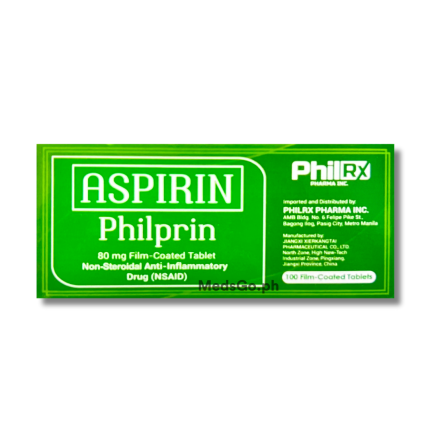All variations
Indications / Uses
PHILPRIN Aspirin 80mg is used for the prevention of serious cardiovascular events, including heart attack and stroke, particularly in patients who are considered high-risk. It functions primarily as an antithrombotic agent to help reduce the formation of blood clots. It is also used in the initial management of certain heart conditions and for the secondary prevention of cerebrovascular events. Furthermore, this medication can be taken for the temporary relief of minor aches and general pain.
Formulation / Ingredients
PHILPRIN Aspirin 80mg contains: Aspirin 80mg
Do I need prescription to buy PHILPRIN Aspirin 80mg?
Yes, you need a prescription. But if you don't have one, you can get a free teleconsultation from MedsGo Physician. Just make an order and our Physician will call you back.
Side Effects
PHILPRIN Aspirin 80mg common side effects include gastrointestinal discomfort such as upset stomach and heartburn, which can often be mitigated by taking the tablet with food. Some individuals may also experience mild headache or a feeling of drowsiness. Less common but reported effects include thirst, or, rarely, signs of hypothermia or fever. It is important to watch for any signs of unusual bleeding or bruising while taking this medication.
Directions and Dosage
- Dosage for Adults (18+ years) in cardiovascular prevention: 1 tablet (80 mg) once daily.
- Maximum Daily Dosage: While dosing regimens vary by condition, the dose for antiplatelet effect is typically 80 mg once daily. For long-term use, do not exceed 160 mg daily unless specifically advised.
The duration of treatment is often long-term and continuous for preventative cardiovascular care. Not recommended for children or adolescents under 18 years of age without explicit advice, especially for viral infections.
Contraindications
Patients with known hypersensitivity to the primary ingredient or other related compounds should not use this product. Avoid use if you have current active bleeding, stomach ulcers, or severe kidney or liver impairment. It is also contraindicated in individuals who have a history of asthma, rhinitis, or nasal polyps that may be exacerbated by this type of medication.
Use in Pregnancy and Lactation
The use of this product should generally be avoided during the third trimester of pregnancy. Avoid use while breastfeeding, especially during long-term use or when taking high doses, as small amounts may pass into the milk.
Special Precautions
- Take caution if you have a history of peptic ulcers or chronic gastrointestinal problems.
- Use should be avoided in children or teenagers suffering from viral infections due to the association with Reye's syndrome.
- Caution is advised in patients with mild to moderate kidney or liver impairment.
- Heavy alcohol consumption while using this medication is highly discouraged.
- Discontinue use about one week prior to any major surgery or dental procedure.
Is it safe to take it with other medications?
Concomitant use with other blood-thinning agents, such as certain anticoagulants, may significantly increase the risk of bleeding. The use of other nonsteroidal anti-inflammatory drugs (NSAIDs) should also be avoided, as this increases the risk of side effects. It is important to review all current medications to prevent potential harmful interactions.
How should I store it?
Store the tablets in a cool, dry place where the temperature does not exceed 30°C. Keep the product protected from direct light and moisture to maintain its stability and effectiveness.
Used For
- Cardiovascular Prevention, Antiplatelet
Age
- 18 years & up
Features
- Aspirin
Reviews
No reviews found
Product Questions



